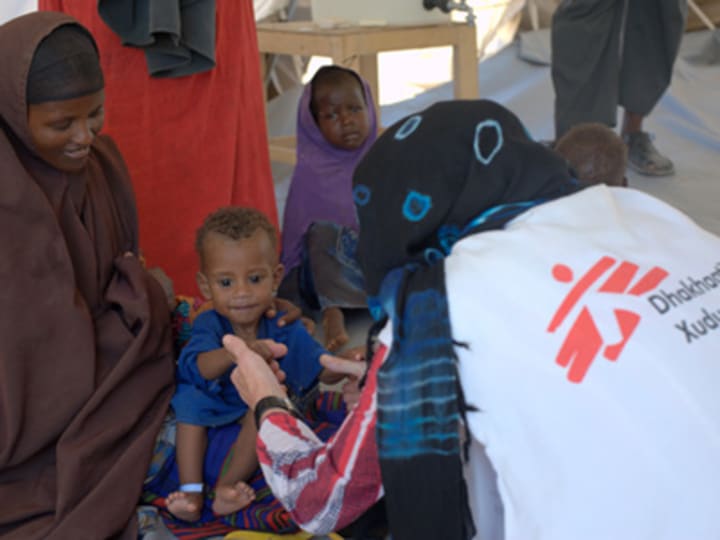
Just two days after Médecins Sans Frontières announced its departure from Somalia, many humanitarians and Somalis are already expressing their concerns over the consequences of the withdrawal.
“I wish that MSF will return soon and or at least the other humanitarian actors will try to provide services in the affected areas,” an aid worker who used to work for the organization told Devex. This humanitarian is one of over 1,500 local employees who are now out of a job.
MSF has spent 22 years in Somalia, providing health care to a population in constant threat of insecurity and exposed to a poor health system. The aid worker said there are districts across the country where the organization is practically regarded as the country’s real ministry of health.
“MSF was the only one who was there for them all through the 22 years of Somalia’s anarchy,” explained the source.
But that’s not the only concern. Dozens of staff members in Nairobi are also set to get laid off, Devex has learned.
“In both countries jobs are hard to come by,” said the aid worker. More than 70 percent of the Somali population is under the age of 30, according to the Somalia Human Development Report 2012, and 67 percent of these are unemployed.
Filling the void
Immediately after the announcement on Wednesday, there’s concern that other aid groups may also follow suit and pull out of Somalia.
However, several top organizations working in the country consulted by Devex dismissed this fears, insisting they have no such active plans, but expressing their sympathy for MSF’s situation.
The International Committee of the Red Cross, which has worked together with MSF on several occasions in the country, was even planning to increase its support for the health sector in southern and central Somalia next year, and was looking into supporting the operations of two additional surgical hospitals apart from two main ones in Mogadishu.
ICRC however admitted MSF’s decision will leave a “very significant gap” in the health sector, particularly in rural areas across Somalia.
“MSF has [been a] constant presence in these communities over the years, so their departure will result in an increase in the health vulnerability of several hundreds of thousands of people. And there is no immediate resolution,” said spokeswoman Maria Cecilia Goin, who added that while the Red Cross does a lot of work across the country, it is “not in a position to take over MSF projects.”
Other groups, particularly those working in the health sector, shared the same feeling.
“We are deeply saddened by the tragic losses and assaults that MSF has faced among their staff. The unfortunate reality is there were already gaps in health care coverage in Somalia, and their departure will only increase humanitarian needs within the country,” noted Margaret Aguirre, head of communications for the International Medical Corps.
International Rescue Committee Horn and East Africa Regional Director Kurt Tjossem added that as an organization that has worked in Somalia for years “we understand the reasons behind the decision,” but noted: “Their absence will be felt, particularly by those they serve.”
World Vision, meanwhile, said the impact of MSF’s withdrawal “is still to early to determine,” but gave the organization credit for engaging with other aid groups to minimize the impact of its decision.
“While the gap left by MSF will be difficult to fill, other organizations providing medical and related assistance in Somalia will coordinate closely with MSF to fill [that] gap,” commented Somalia program chief François Batalingaya.
Same environment, same challenges
MSF is not the only iNGO feeling the heat in Somalia, one of the most challenging countries for humanitarians.
Goin noted how multiple armed actors continue to hamper aid delivery in the southern and central parts of the country, and how the general environment remains very tough for aid workers.
“This is an environment we [all] share — the same environment, the same challenges for any humanitarian organization who wants to deliver their work,” she said, although acknowledging that ICRC has not suffered “the level of human cost that MSF has recently.”
World Vision, meanwhile, mentioned it has shared the same tough environment on the ground as MSF. In 2010, for instance, the organization had to suspend operations in southern Somalia in response to a threat by an armed group. And today, World Vision still needs to travel with armed escorts to field locations in Puntland, Somaliland and Gedo.
“We do so reluctantly and in close coordination with other humanitarian actors,” said Batalingaya.
Our source explained this is true for most organizations working in Somalia: “MSF mainly relies on its acceptance by the population and assurances and safety guarantees from local communities. As an organization that provides assistance in areas affected by emergencies, they have to tolerate up to the lowest level of security assurances and that is why they are vulnerable to these criminal acts.”
“Although I don’t wish to speak for other NGOs, I can assure you today that [they] … have to tolerate the violation of their principles of operation,” added the aid worker.
Read more development aid news online, and subscribe to The Development Newswire to receive top international development headlines from the world’s leading donors, news sources and opinion leaders — emailed to you FREE every business day.




